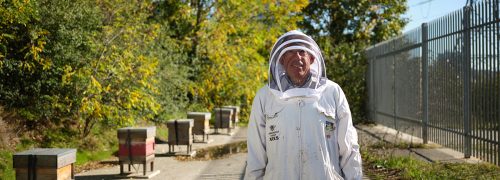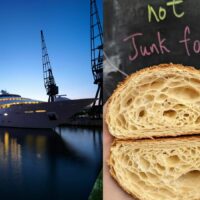
Business
Hive Heroes: Royal Docks Honey Harvest
This week a bounty of honey, produced by the Royal Docks’ resident community of honeybees, was delivered to the Community Food Enterprise, a charity dedicated to combatting food poverty and creating a sustainable food business.
While the Royal Docks may not spring to mind as a bee paradise, it is actually home to two apiaries, managed by Bermondsey Street Bees which produces nationally recognised, award-winning honey every year.
Founded in 2007, Bermondsey Street Bees is a specialist, sustainable beekeeping practice with 18 hives across the Royal Docks, each home to up to 70,000 bees at the height of summer.
Founders Dale Gibson and Sarah Wyndham Lewis explain how the naturally rewilded brownfield sites of the area provide a flourishing ecosystem, where their honeybees can forage without negatively impacting wild pollinators, which are dependent on the same resources.
Their Royal Docks hives are among their healthiest and most productive. Indeed, the honeybees of the Royal Docks regularly feature at the food Oscars and boast an impressive roll call of accolades, including consecutive top spots at the Great Taste Awards.


Founded in 2007, Bermondsey Street Bees is a specialist, sustainable beekeeping practice with 18 hives across the Royal Docks, each home to up to 70,000 bees at the height of summer.
Key to their practice is advocating for pollinator diversity. They explain: ‘There are around 25,000 different bee species on earth, of which just 7 species are honeybees. For biodiversity, all these different bees need to co-exist and the challenge for beekeepers and for anyone interested in ecology and conservation, is maintaining balance’.
They explain how managed beehives are at an all-time high with London currently holding the title of Europe's most densely populated city for honeybees, set against a background of shrinking green space. While public affection for honeybees remains strong, Sarah and Dale emphasise the importance of focussing on habitat, encouraging the cultivation of pollinator-friendly areas as well as allowing flowering ‘weeds’ to thrive. Over the past few years, Bermondsey Street Bees have been responding to the emerging data by moving their hives away from urban hotspots to uncrowded or naturally rewilded land, such as the Royal Docks. Sarah’s best-selling and beautifully illustrated books Planting For Honeybees and The Wild Bee Handbook provide tips on how to create a more sustainable future for pollinator welfare.
Newham Council, with support from the Mayor of London’s Rewild London Fund, launched its Greenway Pollinator Trail last year, which features over 6km of verges sown with wildflowers and grasses to improve biodiversity and create a thriving habitat for pollinator species. Along the trail there are four specifically designed habitat areas including a species-rich wildflower meadow at the heart of Beckton District Park, as one of the first steps in the realisation of the Beckton Parks Masterplan.
From local bee heroes to community hero – this year’s honey harvest was donated to Community Food Enterprise, a charity founded by Newham resident Eric Samuel MBE. Set-up in 2002, the charity has since become an award-winning social enterprise food business and registered charity. With a dual mission, the organisation is combatting food poverty and creating a sustainable food business that offers training, capacity building and employment opportunities to local people.
The Royal Docks’ economic ecosystem is supporting the charity’s endeavours with ExCel providing regular donations of surplus food, as well as other items such as merchandise from exhibitors. While the Factory, creative workspace provider and cultural centre, provides reduced cost office space.


